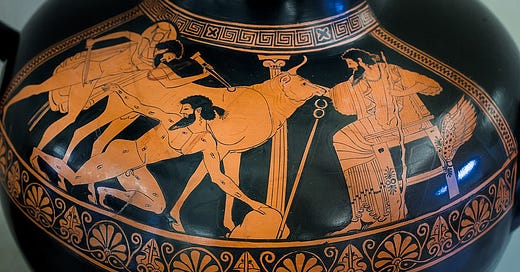Hymn to Hermes Commentary Part One
In which he is Diplomat, Gay Icon, Giant-Slayer, & Snake-Handler
I recommend reading this alongside the full translation of the Orphic Hymn to Hermes I published on June 8, 2023. As mentioned there, this is only the first part of the commentary. Part 2 will be released on June 30th.
Orphic Hymn to Hermes Commentary, Part 1
Herald of Zeus: The Greek word I’ve translated as “herald” is anggelos, the same word that would later come to be used to refer to angels. The standard meaning of the word is a herald, or official messenger of the state. Such a person would not only make official pronouncements, but also carry messages to the state’s subjects.
I say “state” here instead of “king” because it’s important to remember that though kingship was indeed the predominant form of rulership in the ancient Mediterranean, many Greek city-states (and Athens in particular) were ardently democratic—meaning that for much of their history, their government was based on the rule of all adult, male citizens, even those of more humble origin. (It’s beyond the scope of this piece to talk about all the complex contradictions within that democracy—not least of which was the existence of chattel slavery and a near Taliban-level containment of women in the home—but if you’re interested, drop me a line and we can do a live chat on the topic at some point, because it’s something I studied quite a bit in grad school.)
The point here is that as a herald, Hermes/Mercury’s essential function is one of representation and negotiation. He does not issue the message or decide the judgement…he simply delivers and/or argues it effectively, much like an attorney in court, or a UN rep in the security council. For example, one of the most important functions of anggeloi was to carry messages to other city-states or imperial courts, as well as cross enemy lines in order to negotiate peace accords. When they performed this negotiation or peacekeeping role, they wore or carried certain markings identifying themselves as diplomatic envoys. In fact, this is what Hermes’ staff is—it is the standard “equipment” identifying an official herald. (More on that below.)
Maia’s son: Both Homer (in the Homeric Hymn to Hermes) and Hesiod (in his Theogony, as well as in a fragment from his lost work on Astronomy) mention that Hermes is the son of Zeus and Maia, one of the nymphs associated with the Pleiades star cluster. The name “Maia” means “nursing mother” or “new mother” (as opposed to a woman with older or grown children), and as leader of the Pleiades, she was often associated with Gaia, or Earth.





